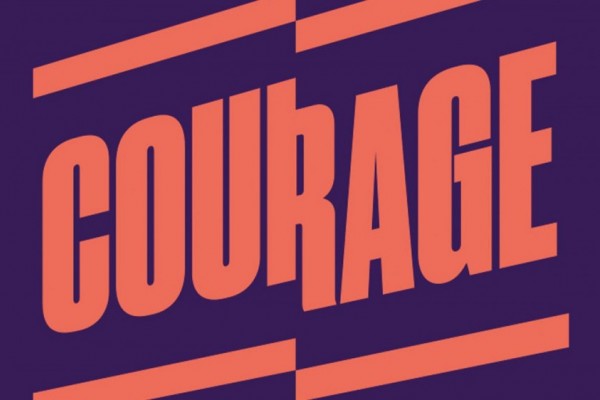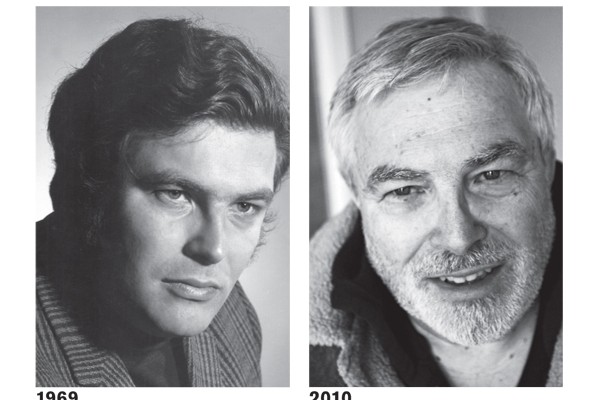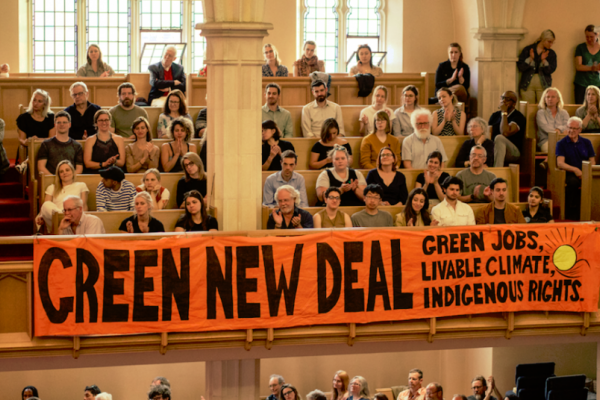Why Media Reform Should Be a Democratic Priority
On New Year’s Day, 2003, few crystal-ball gazers predicted that during that year an estimated three million Americans would contact politicians or sign petitions on – what? The Iraq war? Global warming?
Try again: media concentration. Fed up with drastic cutbacks to local programming following massive consolidation in the radio industry, as well as collusion between corporate media behemoths and the Bush Administration’s drive to war against Iraq, Americans across the political spectrum successfully intervened to prevent the pro-industry broadcasting regulator (the Federal Communications Commission, or FCC) from further liberalizing ownership rules. It was a stunning wake-up call for the secretive, elitist and arguably corrupt process of communications policy making in Washington, as grassroots organizations like Free Press mobilized popular protest.
There are strong signs of a parallel process in Canada (see Canadian Dimension, November/December, 2007). Media reform should be a top priority for progressive politics and democratic renewal in Canada. Why so?
Media are the institutional space that concentrates society’s symbolic power, a concentration that the Internet has only somewhat ameliorated. Yes, the Internet is an invaluable organizing tool for activism – but it’s also a foremost means of neoliberal globalization. Besides, as Steve Anderson discusses elsewhere in this issue, its most democratic aspects are under threat from the logic of enclosure, one backed by powerful corporate and commercial forces.
Why Do Media Matter?
Media both reflect power, but also exert power, in interaction with other social institutions. Media can influence the trajectories of social movements – their emergence, consolidation and success or failure. Writing of the relationship between the mass media and the student-based antiwar New Left of the 1960s, Todd Gitlin (in his classic The Whole World is Watching) argues that mass media generally have forced social movements to choose between adopting “moderate” and specific goals and tactics, or become demonized and marginalized by pursuing more broad-ranging and radical programs: co-optation or marginalization. Even if that dilemma is not as rigid as Gitlin suggests, social movements today have reason to be frustrated with their access to the institutionalized machinery of representation. Given the growing ties between huge media conglomerates, the state and global, neoliberal capitalism, the rise of right-wing hate radio in the U.S.; the decline of the public-service ethos and the spread of hyper-commercialism; and serious cutbacks to journalism – it’s arguably more difficult than it was in the 1960s to mobilize public support through sympathetic news coverage.
Beyond the fate of social movements, media can help massage public opinion. That is not to say that audiences are dupes – but we are likely not to contest media frames unless we have counterbalancing personal experience or ready access to oppositional discourses. Media help set political agendas – not by changing attitudes directly, but by providing maps of the world beyond our own direct experience, and thereby changing perceptions. Cumulatively, media cultivate the popular imagination. It is not hard to see the political usefulness of the typical Hollywood “action” film: a struggle between good and evil resolved by redemptive and legitimated violence. Views and interests excluded by the dominant media face a “spiral of silence”; the holders of views that are not reinforced by media repetition become reluctant to express them for fear of social isolation – and, over time, they cease to hold them.
All told, these concepts combine to suggest an ideological role. One need not accept Ed Herman and Noam Chomsky’s well known “propaganda model” to recognize that generally, and with exceptions, media generate meaning in the service of power.
A Shared Grievance
None of this is particularly new to progressive activists. What might be new is a consideration of how media constitute a shared grievance for the Left, a grievance that is already providing the basis for a growing movement in the U.S. Consider nearly any democratic, progressive movement in North America:
- Environmentalism. Can we build sustainable economies without addressing a culture of consumerism relentlessly promoted by commercial media, locked into a logic of promotion and dependent on advertising revenue from auto dealers, airlines, retail mega-stores and real-estate developers? Not to mention the press framing of environmental issues more specifically, including the slow response to the global climate crisis, treating it as a controversy well after the emergence of a scientific consensus.
- Antiwar. Apart from pockets of insightful journalism from the CBC’s Brian Stewart and others, how much critical analysis has the press provided of Canada’s Afghanistan intervention and its connection to American foreign policy? Canadian journalism has been too prone to the federal government and military’s “Operation Connection,” an effort to embed militarist messages (“fight the chaos”) in various popular formats, from high schools to journalism to spectator sports. (I still recall shuddering at the front-page photo in the Vancouver Sun on the eve of last year’s Grey Cup game: our helmet-toting, hometown B.C. Lions parading through the streets of Winnipeg – in a tank.) In the short term, “Operation Connection” is about military recruitment. In the long run, though, it’s a campaign to legitimize militarism in popular culture.
- Poverty, economic justice and social equality. Of necessity, commercial media pursue profitable demographics. Consider the level of press attention to the political obsessions and material desires of the affluent, from exotic travel destinations and tax cuts to high-tech gadgets and luxury autos. Then contrast that with the coverage of affordable housing, public transit, child poverty, or income redistribution. Consider also the disproportionate press access accorded over the past decade to pundits of the neoliberal Right, like the Fraser Institute, documented in NewsWatch Canada’s book, The Missing News.
- Spiritual values. Secular progressives too often overlook the contributions of religion to social democracy in Canada, the civil rights and anti-war movements in the U.S. and other social-justice causes over the past century. Today, communities of faith and people convinced that a just social order must embody other-oriented ethics have every reason to oppose a media system that celebrates rampant consumerism and individualistic narcissism. During the 1990s, the Christian environmentalist writer Bill McKibben spent a year viewing one day’s worth of programming from dozens of channels. In The Age of Missing Information, he concluded that television had one overwhelming message: It’s all about Me, about people “having to have every desire that enters their mind gratified immediately. That kind of culture is going to be a violent one, no matter what images one shows.”
- Racial justice. According to Malkia Cyril of California’s Youth Media Council, American television consistently demonizes young, black men as criminals, creating a climate in which it is easier for police to shoot unarmed blacks with impunity. In Canada, according to research by Robert Harding and others, the press distorts the realities of internal colonialism, portraying Aboriginal people as incapable of managing their own affairs.
- Human rights. Herman and Chomsky have documented the U.S. media’s highly skewed picture of human-rights violations, overplaying threats to “western” interests, underplaying “our” own governments’ roles. More broadly, communication rights (not just to speak, but to be heard and understood) should be regarded as fundamental to human rights in general.
- Democracy. Quite apart from specific issues and movements, American critics like Robert McChesney (in his Rich Media, Poor Democracy, and elsewhere) have identified a number of ways in which corporate media are failing to help constitute a democratic public sphere. Media are putting quick profits before public service, centralizing symbolic and political power through mergers and “convergence,” homogenizing public discourse behind a veneer of channel proliferation, and abandoning their investigative, “watchdog” role as they develop symbiotic relationships with governments and regulators. Meanwhile, public access to socially produced knowledge is limited behind walls of “intellectual property rights.” Privacy, free expression and other communication rights are eroded in the name of national security and the “war on terror,” and communication policy is still made without adequate public participation, knowledge, or media coverage.
Canadian Media: Dark Future or Opportunity?
All these democratic deficits are arguably more blatant in the U.S. than in Canada; but as David Skinner points out in this issue, Canada, too, may be on the threshold of a neoliberal remaking of communications. The alignment of industry interests craving deregulation, a Canadian Radio-Television and Telecommunications Commission leader ideologically committed to market supremacy, and a tightly controlled Conservative federal government pursuing a majority, raise the spectre of Canada’s media system (and much else) going further down the road of a more monopolistic and viciously inegalitarian form of capitalism. One need only look south of the border to see what that could mean for quality public-oriented journalism, and for social-movement access to public discourse.
But along with threat, there is opportunity. Some crucial policy decisions have yet to be made, and, if only for legitimation purposes, there are likely to be public hearings. A federal election campaign would raise opportunities (with advance preparation) for holding parties’ feet to the fire on their commitment to democracy and pluralism. Civic campaigns on media issues have historical precedents. Canada was home to one of the world’s earliest, most successful and politically diverse media-reform movements – the Canadian Radio League, which campaigned in the 1930s for public broadcasting against the forces not only of cultural continentalism, but of excessive commercialism, too. The CBC – and such democratic values as are embedded in our media system – owe much to that struggle.
A Constellation of Canadian Media Struggles
In the 1990s, the Council of Canadians and other groups created a common front, the Campaign for Press and Broadcasting Freedom, to oppose Conrad Black’s then-growing domination of Canada’s press. The CPBF took its name from a British group advocating since 1979 for accountable, representative and public-service media in the politically hostile climate of Thatcherism. While the Canadian CPBF dwindled after a failed court challenge in 1997, democratic media activism has blossomed, not only here but in other countries since then – indicating the growing recognition by social movements of corporate media as a blockage, the new openings provided through digital networks, and the “mediatization” of politics and culture more generally.
Examples include the annual Media Democracy Day held since 2001 in Toronto, Vancouver and other cities, simultaneously promoting and celebrating media education, structural and policy media reform, and the achievements of independent and community media. In the distinct society of Quebec, cultural activism and community media have a long and rich history. Most recently, a new coalition has emerged following a conference at the University of Windsor last May on Chomsky and Herman’s propaganda model. People wanting to move beyond critique to develop a liberating alternative formed a Campaign for Democratic Media, which with impressive rapidity brought together over sixty labour groups, consumer groups, small businesses, independent and community media outlets, advocacy organizations, media watchdogs, academics, bloggers and other Canadians, including many not previously engaged with media policy. The CMD was instrumental in delivering 1,900 citizen comments to the CRTC’s public process on media diversity. It has since held organizing meetings in Toronto and Vancouver, and facilitated other campaigns, including pressure on the Ontario press to cover the referendum on electoral reform and an application for a community T.V. license in B.C. and Alberta by the Community Media Education Society.
Many Media Battlefields
These developments are not isolated. Throughout the Anglo-American heartland of neoliberal globalization, an organizational ecology of media activism has emerged, straddling both civil society and the “system” of state and economy, and intervening to change the conditions and structures of media production, as well as the environment (audiences, culture, state policies, regulatory regimes) within which media are produced. Alternative media, media educators, watchdog projects, media workers’ unions, journalists’ associations, strategic communication by social-justice movements building counter-publics, even parliamentary hearings and dissident regulators together comprise a critical mass for media democratization.
Very possibly, it will be less a movement-in-itself than a nexus between existing movements, both drawing from and contributing energy toward the broader project of creating a more sustainable, humane and democratic society. It is particularly likely to appeal to media-savvy youth who do not see themselves as part of the traditional Left. To the extent that media are democratized, the road for other struggles is made easier.
Further Reading
- Jeff Chester, Digital Destiny: New Media and the Future of Democracy (New Press, 2007)
- Nick Couldry and James Curran, eds., Contesting Media Power: Alternative Media in a Networked World (Rowman & Littlefield, 2003)
- Assessing Communication Rights: A Handbook, Campaign for Communication Rights in the Information Society (CRIS), www.crisinfo.org (September, 2005)
- Marc Edge, Asper Nation: Canada’s Most Dangerous Media Company (New Star, 2007)
- Robert A. Hackett and Yuezhi Zhao, eds., Democratizing Global Media: One World, Many Struggles (Rowman & Littlefield, 2005)
- Robert A. Hackett and William K. Carroll, Remaking Media: The Struggle to Democratize Public Communication (Routledge, 2006)
- Robert W. McChesney, The Problem of the Media (Monthly Review Press, 2004)
- Robert W. McChesney, Communication Revolution: Critical Junctures and the Future of Media (New Press, 2007)
- David Skinner, James Compton and Mike Gasher, eds., Converging Media, Diverging Politics: A Political Economy of News Media in Canada and the United States (Lexington, 2005)
This article appeared in the January/February 2008 issue of Canadian Dimension (Big Media).










